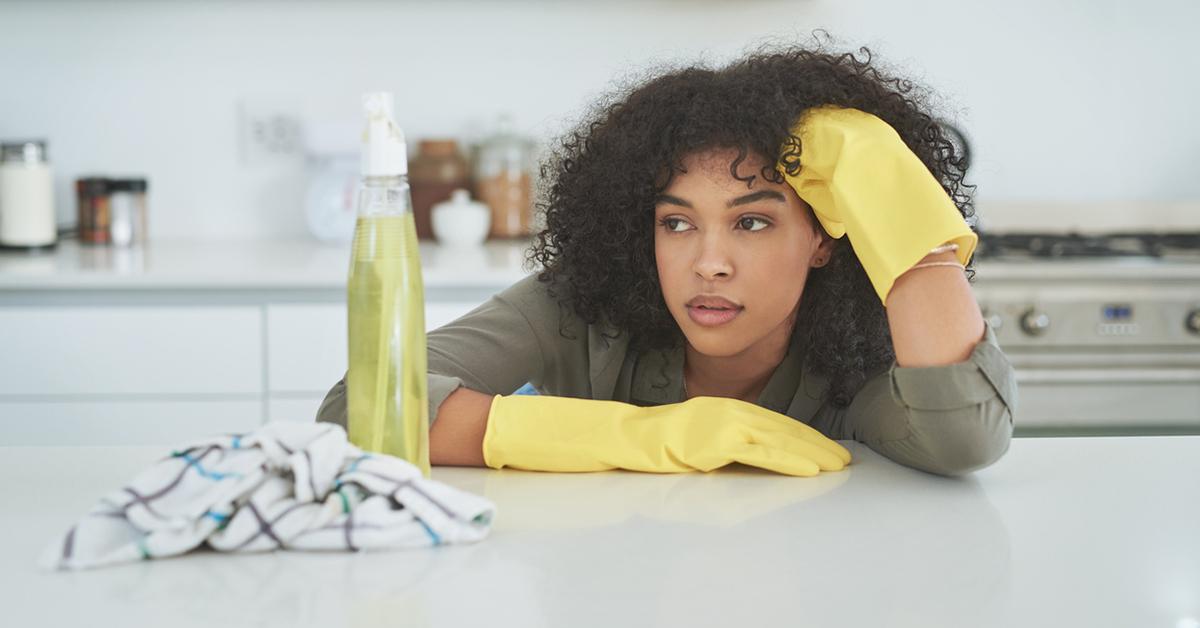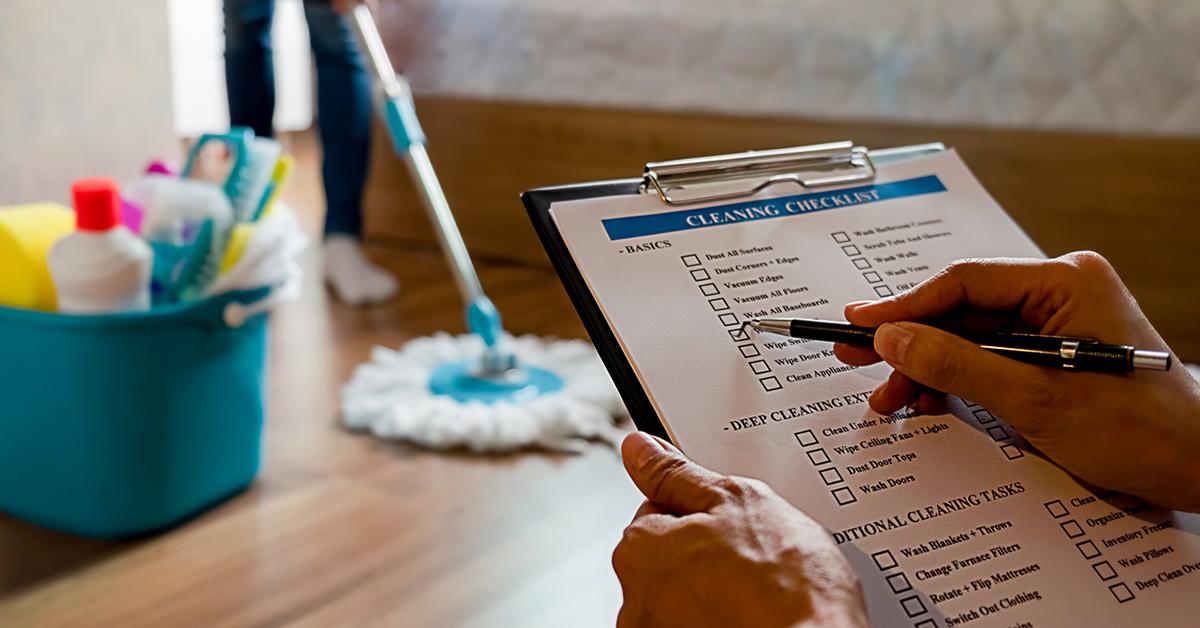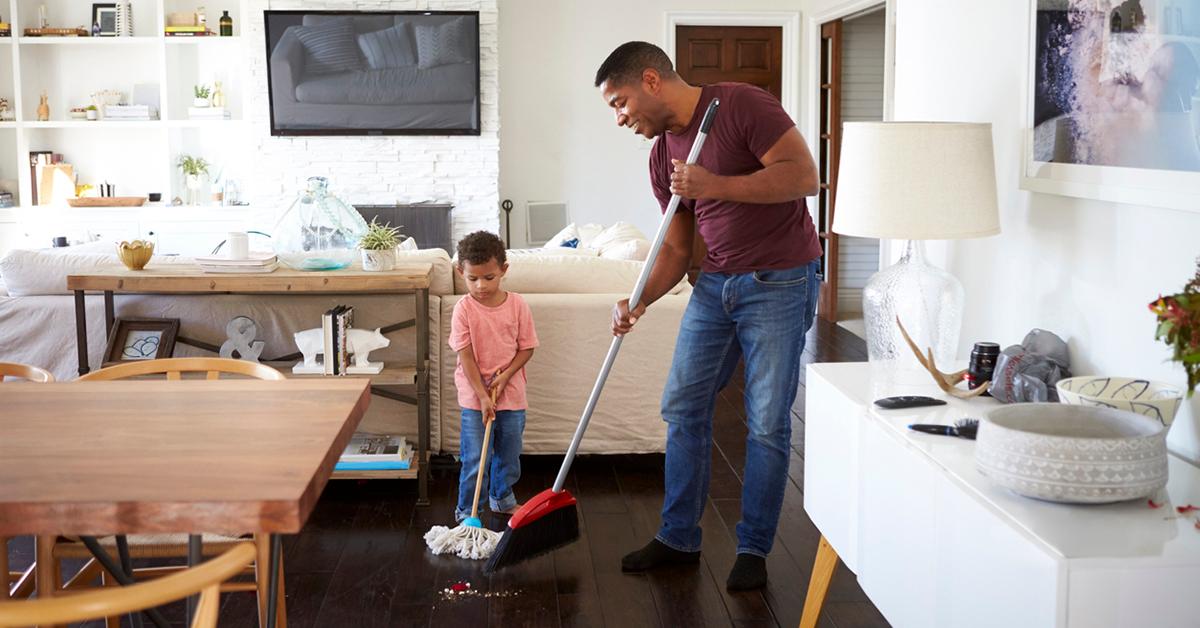Spring Cleaning Tips: How to Make the Most of Your Time at Home
We might as well all come out of this COVID-19 self-isolation thing with an immaculate, well-organized, and cleaned home!
Updated April 9 2020, 12:09 p.m. ET

It may not feel like spring since most of us are tucked away inside, desperately trying to #FlattenTheCurve of coronavirus but as the old saying goes, April showers bring May flowers, and so, it’s time to start thinking about a little spring cleaning.
After all, there isn’t much else to do while stuck inside anyway. We might as well all come out of this COVID-19 self-isolation thing with an immaculate, well-organized, and cleaned home. Right?!
Why is it called spring cleaning?
Spring cleaning is the practice of cleaning your house at the start of spring, as the weather gradually becomes warmer. The thought process behind spring cleaning is that a home could benefit from a thorough cleaning — not just a surface-level one — after the long, cold months of winter.
What is included in spring cleaning?
The good news about spring cleaning is that there really aren’t any rules. Spring cleaning is more of a general idea than a specific method of cleaning or organizing. While some camps of organizational thinking have specific guidelines for how you “should” clean or organize your house, a spring cleaning is really what you make it.
For example, under the KonMari Method of tidying up, you should clean or organize your house by category, not by room. Other ways of organizational thinking will recommend combing through your house room by room — start with the kitchen, then once that’s finished, move on to the living room, etc. Oprah, for example, offers this room-by-room spring cleaning schedule categorized by time slots on her website. It doesn’t matter which method you use; it just has to work for you and your lifestyle.

While there are no set rules for a spring cleaning, you should try to go through everything as thoroughly as possible. Make sure to tackle each of your main rooms, bathrooms, and don’t forget about the closets. If you are feeling super ambitious, tackle the garage, too.
Try to get rid of anything you don’t use, need, or didn’t know you had by donating it. If something is broken, get rid of it — recycle it if possible, and toss it if not. If you’re up to the challenge, go through your clothes closets and sort through your seasonal clothes, getting ready for the summer wardrobe and donating winter/fall pieces you didn’t wear, are well-worn, or that you don’t want.
Some people choose to get extremely thorough with their spring cleaning, as in power washing the house or backyard patio, deep cleaning the rugs, and washing the windows. You can also extend the spring cleaning to the outdoor parts of your property — the front and backyards. Mow the lawns, clean up the garden beds in preparation for the warmer months, and trimming the trees, plants, and bushes.
Ultimately, it’s up to you how deep you get but at the end of the day, a spring cleaning is really what you feel comfortable with. It’s what you make it.
How do you start spring cleaning?

So, you have committed to a spring cleaning. Where are you supposed to start? The best way to start is to commit to either one project, one room, or one category. Once you decide how you want to proceed, start from there.
Say you choose to go room-by-room. You might want to start with the kitchen because it’s either the messiest or the easiest room to tackle. Don’t move on to any other rooms in the house until the kitchen is up to your own spring-cleaning standard. Organize the cabinets, deep clean the surfaces – table, stovetop, countertops — clean inside the oven, toaster, toaster oven, and microwave, clean the backsplash tiles, organize the pantry, wash and beat any rugs, and vacuum and mop the kitchen floors. Now, you can move onto the next room.
Alternatively, if you choose to go by category rather than room, try the KonMari Method. The first category to tackle following the KonMari Method is clothing. This means you would sort through all of the clothing in the house before moving onto the next category, which is books. To sort through clothes, you would make a “keep” pile for items that “spark joy” and a “donate” pile. Donate what’s going and properly fold all of the clothes that are going back in drawers and closets. Next is books, then papers, then kimono — which means miscellaneous items that do not fit into any other category — then lastly, sentimental items.
Tips for spring cleaning:
Need more spring cleaning tips? The most efficient spring-cleaning advice we can give is to have a schedule. If you try to take on the whole home in one day, you’ll give up within hours. The better you compartmentalize and celebrate the small spring-cleaning victories, the more you will get done over time. Keep reading for more helpful spring-cleaning tips!
Have a Schedule
Not sure how to draw up a schedule to start? Try Oprah’s room-by-room spring-cleaning schedule that actually allocates time slots to each room. Oprah has you start with the bathroom, working on organizing and cleaning the first bathroom from 9 to 10 AM. By 2 PM, you’ll be finishing up in the kitchen and your house will already be in good shape in just one morning.
Use Categories to Your Advantage
Earlier, we mentioned piles. During spring cleaning, piles are a girl’s or guy’s best friend. As you go through each of your items, separate them into three types of piles: trash, donation, or keep. Sorting into piles will also give you a meaningful visual of how much you are keeping versus how much you’re donating or trashing.
Enlist the Help of Others
This tip is a bit more difficult now because of, you know, self-isolation, but there’s a few things you can do to ask for some support. If you’re isolating with family members — yes, children count! — they can contribute to the sorting, organizing, and cleaning along with you. You can dole out specific tasks you need help with and tailor it to kids as well.

If you’re isolating alone and still need an accountability buddy during your spring cleaning, set up a FaceTime or Zoom date with one of your friends. You can hold each other accountable while going through one room or one category at a time.
Keep Your Cleaning Products Simple
Don’t fall into the trap of thinking that every different surface in your home needs a different kind of product cleaner. At the end of the day, there are only a handful of effective nontoxic cleaning agents out there and that’s really all you need: vinegar, essential oils, liquid dish soap, water, rubbing alcohol, high-proof vodka, Castile soap, borax, and washing soda. Maybe some lemons. What else could you need?
Give Everything a Place
This is one of the most popular organizational tips that all organizing and cleaning professionals can agree on, no matter which organizational method they prefer. Everything should have a place in the home. So, once you’ve deep cleaned and done all your seasonal chores, make sure that each item has a place where it “lives.” That way, you never lose the remote again or misplace your beloved AirPods.